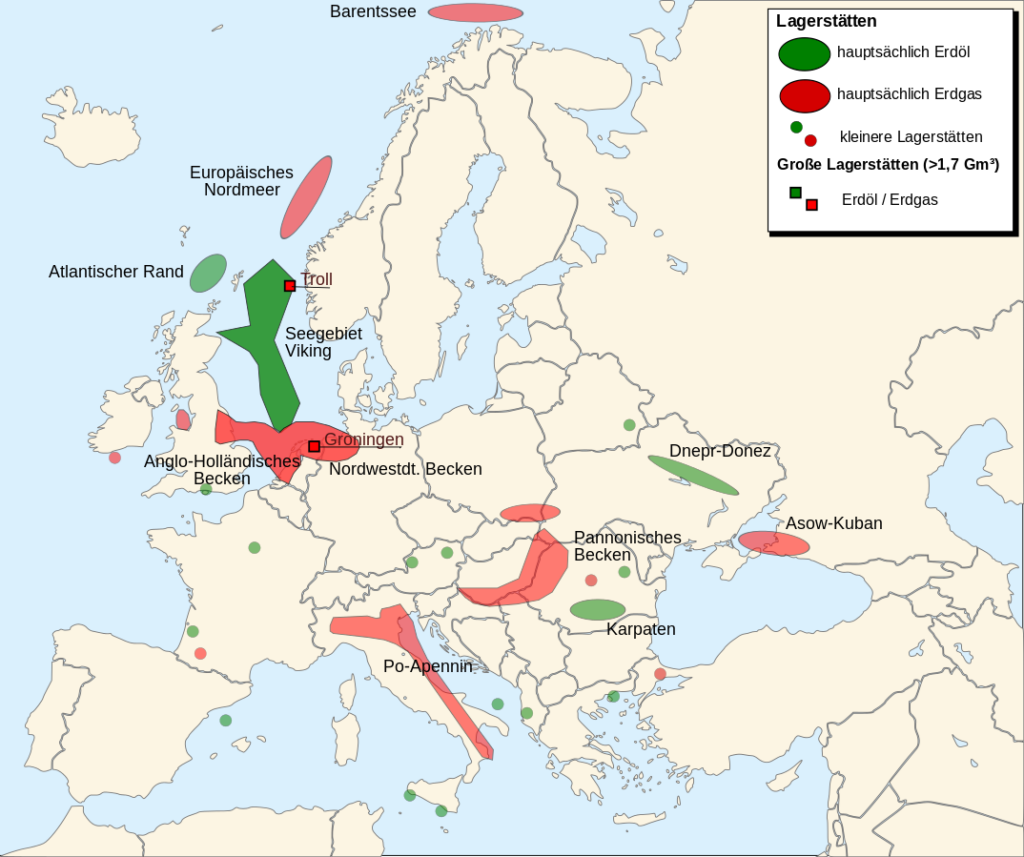Natural gas production in the North Sea must be stepped up. In the meantime, the German and Dutch gas storage facilities are threateningly empty. One expert demand is therefore: the existing gas fields must be used even more. This applies, among other things, to the area around the Dutch city of Groningen. This is where the world’s tenth largest gas field is located. Natural gas production in the North Sea could also be further expanded on the German side.
Go-ahead for natural gas production in the North Sea in April 2022
In mid-April 2022, the Lower Saxony Ministry of Economics and the Dutch production company One-Dyas agreed on key points of a natural gas production off Borkum. Probably the largest natural gas field discovered in the North Sea in the last 25 years lies 20 kilometres off the coast of the island. The Dutch want to develop it, they suspect a total volume of 60 billion cubic metres, as Minister of Economics Bernd Althusmann explained in Hanover.
From 2024 onwards, five billion cubic metres can be extracted annually. The field is located in the border area between the two states not far from the Lower Saxony Wadden Sea National Park. The production platform will be visible from Borkum. The natural gas production there in the North Sea will be carried out via horizontal wells. The quantity of five billion cubic metres would correspond to that which Germany is currently producing. However, Germany’s demand is 90 billion cubic metres per year.

Bild: Pétrole_et_gaz_-_Europe.svg: historicair 17:35, 2 March 2007 (UTC)derivative work: NNW, CC BY-SA 3.0, via Wikimedia Commons
Natural gas production in the North Sea would therefore only be one building block for energy supply security at this point. However, it is considered enormously important because of the current geostrategic situation. Experts expect bottlenecks in natural gas as early as the next few months (as of May 2022). It is important to become independent of Russian imports as quickly as possible.
Natural gas production in the North Sea: division between Germany and the Netherlands
Half of the gas produced off Borkum is purchased by Germany and half by the Netherlands. The latter did not have to be convinced to start producing natural gas in the North Sea, but on the German side there was resistance from the Greens in the Lower Saxony state parliament and from environmental associations. The governing coalition in Hanover (SPD and CDU), however, pushed the project through.
Their Environment Minister Olaf Lies explained that Germany was dependent on Dutch gas and therefore could not prohibit the neighbouring country from producing natural gas in the North Sea for environmental reasons. That is why they had talked to One-Dyas. According to the minister, the chances of reaching an agreement are very good. According to Lies, everyone knows how important independence from raw materials is in view of the Russian war of aggression on Ukraine. One cannot become independent of Russian gas fast enough.
Declining domestic production quotas
Domestic natural gas production has steadily declined in Germany in recent decades. It was considered too costly and unnecessary because people believed in the secure supply of Russian natural gas, as Ludwig Möhring confirms. The Managing Director of the BVEG (Bundesverband Erdgas, Erdöl, GeoEnergie – Federal Association for Natural Gas, Oil and GeoEnergy) addresses the essential issue of supply security, which is suddenly in the spotlight. A sustainable gas supply strategy is needed very quickly. Möhring considers it absolutely plausible that natural gas production in the North Sea could also contribute to this. In any case, Germany has possibilities to supply itself with domestic natural gas.
Until the early 2000s, the share of domestic production covered about 20 % of consumption, the expert says. Of course, at that time the natural reserves were still fuller. The transition to increased exports, primarily from Russia, was also a political decision. Russian gas is comparatively cheap, and there was also a belief in the interconnectedness of states and systems through trade. This belief determined German foreign policy some 60 years ago.
The narrative “change through trade” was promulgated in 1963 by the Tutzing Protestant Academy and immediately taken up by Egon Bahr, then spokesman for Willy Brandt (Federal Chancellor from 1969). The idea was to get closer to the Eastern Bloc through trade relations and thus contain the danger of war. This worked, after all – until 2022. The fact that later chancellors, up to Angela Merkel, continued this policy cannot be blamed on them. Putin overrode the mechanism with his bellicose revisionism. The West must now reorient itself with lightning speed. Natural gas production in the North Sea will contribute to this.
Time factor in natural gas production in the North Sea
Unfortunately, the development of new natural gas fields takes a little longer. This has not only technical but also political reasons: Environmentalists and other interest groups raise objections and not infrequently go to court to prevent projects. However, experts point out that new priorities have to be set since 24 February 2022. They say that every possibility for an independent energy supply must be exhausted, including through natural gas production in the North Sea.
